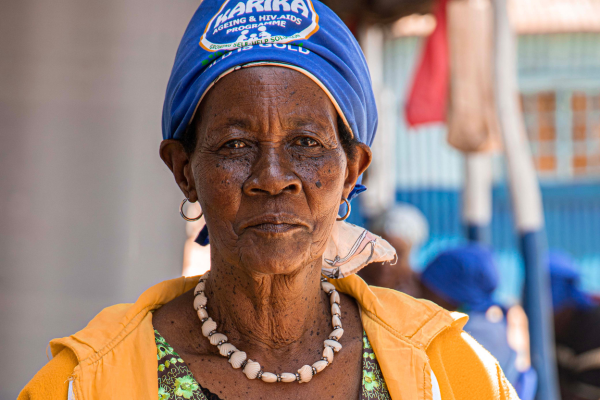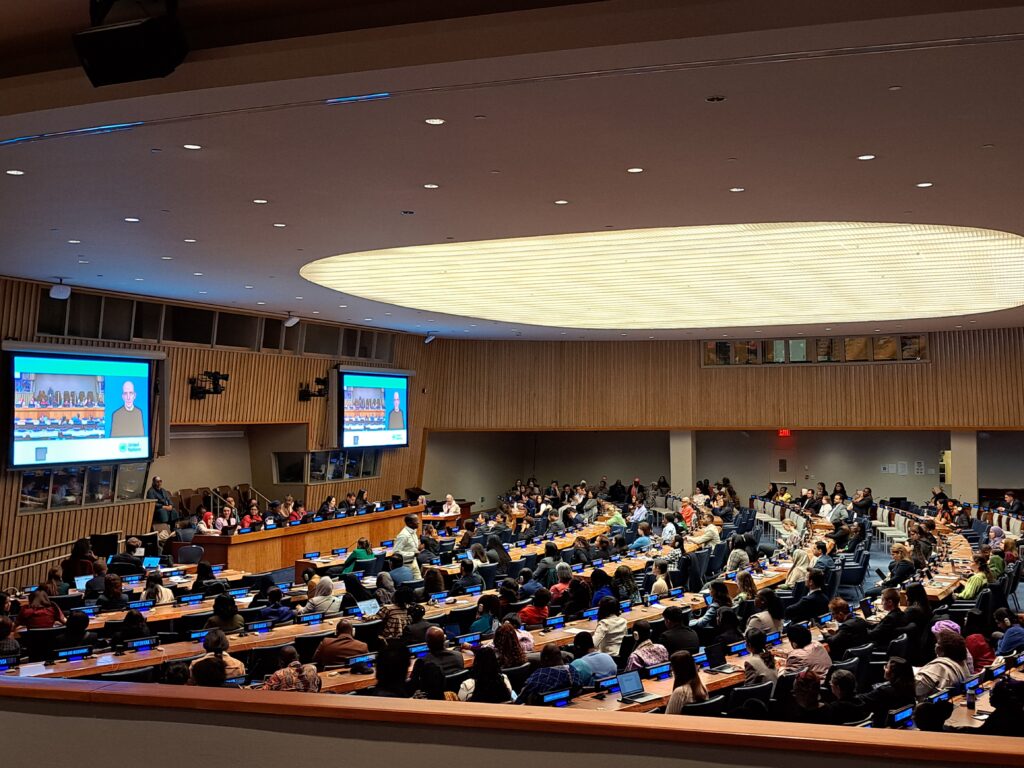Pensions are vital for older women’s health
State pensions and access to social protection are not only essential for older women to achieve their rights but also vital for their health and wellbeing. This year’s United Nations (UN) Commission on the Status of Women was an opportunity for Age International, an Action for Global Health member, to highlight this – their CEO, Alison Marshall, explains below.
In March, I represented Age International at the 68th gathering of governments, UN agencies and civil society organisations from around the world focusing on women’s rights. The review theme this year addressed ‘social protection’. This means the policies and schemes that governments put in place to reduce and prevent poverty and vulnerability and to support participation in society. It includes payments to improve financial security like child benefits, maternity pay, unemployment support, sick pay, disability benefits, as well as access to healthcare and a state pension in older age. Everyone has a right to social security!
Research shows that women are disproportionately affected by poverty, including in older age. Pensions can make a huge difference to older women’s health and wellbeing, enabling them to live with dignity, increase their ability to get healthcare and build their resilience. We also know that pensions support whole families. For example, grandmothers use their pensions to buy food or medicines for family members.

Mary, 68 years old, Kenya:
“I would like for the government to look after older people. Some of these older persons are abandoned with children and grandchildren. This is a big challenge because they do not have jobs thus bringing a lot of stress into their lives… The government pension (‘Inua Jamii’) programme is important, but I have never received this money. I have already submitted my name for registration but have never received any money from them. This money would have helped me. I wanted to be registered for the National Health Insurance Fund, but I lacked the money for registration. When I go to the hospital, I have to pay to receive any medication.”
Regrettably, in many countries there are no state pensions, and even where there are pensions, the amount older women receive is often so low that they still live in poverty. Attending the UN Commission and taking part in events throughout the week gave me the chance to highlight the need for decent pensions, and access to health services and care for older women like Mary.
There were women at the Commission from all over the world, from Australia to Zambia. It was a privilege to hear women speaking out about the challenges they face wherever they live in the world: unpaid care work, lack of health services, violence and exclusion, discrimination and poverty. And it was uplifting to hear all the ways women are fighting back through education, entrepreneurship, mutual support, activism and participation in decision-making.
I joined a discussion where Alicia Herbert OBE from the Foreign, Commonwealth and Development Office (FCDO) explained that 4 billion people around the world receive no social protection, and described how the UK Government seeks to support women of all ages. Jean Sendeza, the Malawian Minister of Gender, Community Development and Social Welfare, talked about Malawi’s social protection programme ‘Mtukula Pakhomo’, which aims to support the poorest in society and those who are unable to work due to disability, illness or being in education. In conversation afterwards, I highlighted that, according to our research, many older women in Malawi don’t know about the scheme, which along with other barriers, explains why older women make up only 8% of the individuals benefitting.

A discussion taking place at the UN Commission on the Status of Women
Another event focussed on care. Speakers from the International Labour Organisation, UN Women and the Governments of Chile, Mexico and Uruguay discussed what can be done about the enormous amount of unpaid care contributed by women across the world. Our analysis of countries with available data shows that older women provide, on average, over four hours of unpaid care work every day. The speakers considered both providers and receivers of care and called for 5 Rs for paid and unpaid carers:
- for unpaid care to be Recognised (in government accounts);
- Reduced;
- Redistributed (so it is shared equally with men);
- Rewarded (paid properly);
- and Represented (e.g. care workers being represented by unions).
A speaker from the Office of the High Commissioner for Human Rights also reminded everyone of the need for a new UN convention on the rights of older persons. A UN Convention is an international agreement formed by national governments from around the world, and a convention on the rights of older persons would provide a definitive statement that older people matter and have specific rights and needs that must be met.
Alongside the vast range of events held and connections made, governments were deep in negotiations on ‘Agreed Conclusions’ for this year’s Commission. Amid the back and forth on phrases and recommendations, we helped to secure significant wording recognising the rights and contributions of women of all ages, how inequality accumulates over a woman’s lifetime, and the meaningful participation of older women. We hope governments and institutions will build on this in their work in the months to come, and at subsequent Commissions.
The challenges facing women, including older women, are acknowledged by many, but progress to address them is too slow. There are plenty of words about access to health and care services, and pensions, but governments need to put more funding into social protection schemes that have been proven to work. And we will continue to hold governments to account, because older women can’t wait!
Read more about how pensions can help older women live healthier, happier lives on Age International’s website.
